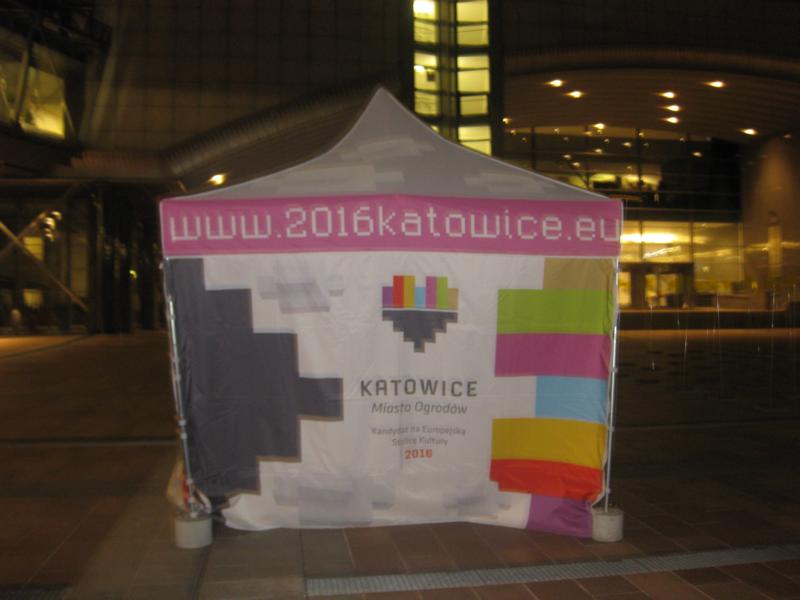Candidate cities
Katowice 2016 in front of the European Parliament in Brussels
Selection of ECoC cities for the period 2020 - 2033
|
2020: Croatia and Ireland (and candidate) 2021: Romania and Greece 2022: Lithuania and Luxembourg 2023: Hungary and UK (and candidate) 2024: Estonia and Austria 2025: Slovenia and Germany 2026: Slovakia and Finland (and candidate) 2027: Latvia and Portugal 2028: Czech Republic and France 2029: Poland and Sweden (and candidate) 2030; Cyprus and Belgium 2031: Malta and Spain 2032: Bulgaria and Denmark (and candidate) 2033: Netherlands and Italy |
Source: http://ec.europa.eu/culture/calls/general/2014-eac-14/request-eoi_en.pdf
The European Commission has to face several issues at all once:
- Member states like Luxembourg have only one candidate city
- How to ensure competition being fair and able to give all cities an equal chance
- How to ensure the selection process remains fair and square
Previous selection period up to 2019
- 2016: San Sebastián, Wrocław[5]
Spain 2016
San Sebastian 2016, eventually selected, was in the final round in competition with 5 other Spanish Candidates: Burgos [3], Cordoba [4], Las Palmas de Gran Canaria [5], Segovia [6] and Zaragoza [7]. Alternatively, click here [8]for a general overview.
Links:
[2] http://www.flickr.com/photos/sansebastian2016/sets/72157626874304810/
Poland 2016
There were in the first round 11 candidate cities in Poland for 2016 with 5 of them making it into the second round (Gdansk, Lublin, Katowice, Warszawa and Wroclaw); Wroclaw 2016 finally did get the designation.
Denmark 2017
In Denmark there was competition between two cities, Sonderborg and Aarhus. For a long time the bid was prepared by Trevor Davis who held the same position of artistic director already when Copenhagen was European Capital of Culture. In October 2013 it was learned at the conference of the University Network of European Capital of Culture that he sought the post but did not get it after the designation of the title went to Aarhus
Since preparing of the bid means a lot of investments have been made by the other city (or cities) bidding as well, it is worthwhile to look into how Sonderborg prepared itself for the final decision by a Jury made up of 13 experts, seven being delegated from European institutions and six acting as national experts on behalf of the country in which a Cultural Capital City is going to be selected from.
Cyprus 2017
Paphos in Cyprus got the bid; that city is well known for its world heritage.
Malta 2018
2018: Netherlands, Malta
Valletta was the only city proposed to be for Malta the European Capital of Culture.
Holland 2018
Cities of Leeuwarden, Eindhoven and Maastricht are short-listed, while The Hague and Utrecht dropped out of the bid after the Jury had met.
For EU Press Release after the Jury met in Amsterdam, Nov. 30, 2012, see
http://europa.eu/rapid/press-release_IP-12-1300_en.htm
Eindhoven 2018
consists of five cities: Eindhoven, Hertogenbosch, Tilburg, Helmond and Breda
There bid includes already an ongoing research to monitor the impact by Greg Richards from Tilburg University (see pages 112 - 113)
http://www.onlinepublisher.nl/2018eindhovenbrabant/2018_eindhovenbrabant.html
Italy 2019
There were competing altogether 21 Italian cities for the title, five of which were placed on the short list after the jury came to a decision in October 2013. These five cities are Ravenna, Siena, Lecce, Perugia, Matera and Cagliari.
Matera 2019 received the designation
Bulgaria 2019
with Plovdiv 2019 having obtained the title.
Ireland 2020
Irish candidate cities for the ECoC title are Limerick and Galway.
Greece 2021
It is unclear whether or not the current government under Prime Minister Samaras shall be able to focus on the need to prepare the grounds, so that cities declare their candidacy in time to be officially recognized. Until now there had not been any competition for this title within Greece as a central government along with the way politics is realized in that country leaves no room for a bottom-up process. Spyros Mercouris has proposed already to the former Minister of Culture Piraeus in connection with Salamina -the latter for historical reasons, the former for being close to ship owners and Cosco, the Chinese operating company of the container terminal. Some other cities like Iraklion, Ionnia, even Volos and especially Nafplion come to mind since 2021 will be 200 years after Greece emancipated itself from the Ottoman rule. Given the crisis and recession which has been hitting hard the entire country since 2009, it is a crucial question what cultural concept is compatible with the financial sponsors needed. Like in the case of Marseille, there are different choices possible, provided the aim is not to construct highly visible buildings which become in the eyes of a media scanning a city highly symbolic icons like the Guggenheim museum in Bilbao. But a further examination of the state of affairs in Greece can foretell that there is no such willingness to seek an alternative to the usual conventional routes. Always there manifests itself the tendency to imitate a successful model, but which becomes through the method of imitation a conventional thing if not outrightly so kitsch. This can be reflected onhand of the pros and cons of the new Acropolis museum in Athens. It was expensive, late in completion and has as many negative as positive aspects e.g. waste of space or negative space having no meaning whatsoever. (hf 20.10.2013)
HF last update 1.11.2014
« Reports | Guide for candidate cities 2020 2033 »

